Mozambique's Long Road to Recovery after Idai
By Huang Shi-ze (黃世澤)
Abridged and translated by Syharn Shen (沈思含)
Mozambique's Long Road to Recovery after Idai
By Huang Shi-ze (黃世澤)
Abridged and translated
by Syharn Shen (沈思含)
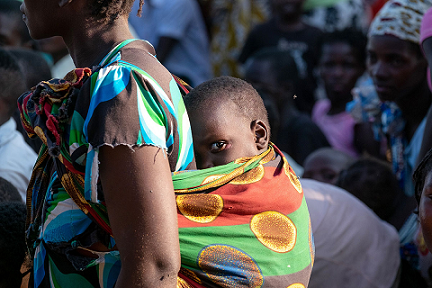
During my visit to the village of Lamego in Sofala Province in central Mozambique, I meet 55-year-old Barta. Sitting on a collapsed wall, she stares blankly at the kids playing in the mud in front of her. The destroyed wall is what is left of her house, which was once home for twelve people and was crushed by Cyclone Idai. Barta and her family now live in a thatched hut behind the ruins of their old house.
"After the flood submerged everything, we had nothing to eat for three days." When the flood came, Barta and her family climbed up the tree by their house. As the flood kept rising, they couldn't do anything but pray. Recalling the day when the disaster struck, Barta knitted her eyebrows and said that all the trees were crowded with people. Besides trying to keep their balance on the trees, no one knew what to do.
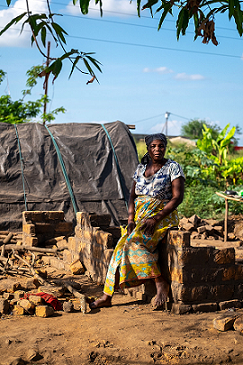
With a blank look in her eyes, Barta sits on the destroyed wall of her old house wrecked by Cyclone Idai.
Idai's Devastation in Mozambique
In mid-March of 2019, the catastrophic Cyclone Idai tore through central Mozambique, killing more than 600 people, devastating the port city of Beira, destroying hundreds of thousands of houses, schools, hospitals and buildings as well as inundating vast expanses of the county's fertile lands.
The floods brought by Idai did not recede and exacerbated the already poor hygienic conditions of the affected areas while posing a high risk of disease outbreaks. In need of water, the local survivors dug wells and after letting the impurities settle, drank the dirty water directly. Even though the WHO quickly distributed vaccines in Mozambique after the disaster, a cholera outbreak still ensued, with more than 6,000 cases and 8 deaths reported.
The floods also inundated nearly all of the land in one of Mozambique's key agricultural areas, Buzi District. By the time I visited the area in early May, most of the water has receded, with some puddles of standing water still remaining in the lower areas. The uprooted trees slumped on the ground are a grim reminder of the devastation brought by the floods. Over the distance, vast expanses of farmlands spread before my eyes, but on a closer look, the crops which should have been ripe and golden have rotten and turned brown as they were submerged in water for too long.
Around 711,000 hectares of crops in Mozambique have been destroyed by Cyclone Idai. Farmers have been left with no harvest, and the country heavily dependent on agriculture is facing a food shortage crisis and a real threat of famine.
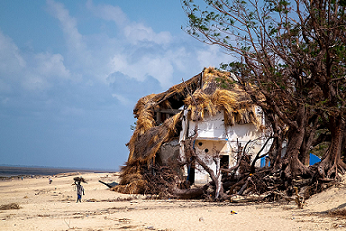
Two months after Cyclone Idai hit Mozambique, the beaches of Beira have returned to their previous state, but the ruins of a large building still remind one of the destructive power of the cyclone. |
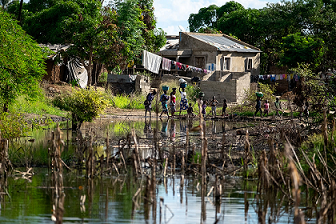
In Tica, floods brought by Cyclone Idai have not receded. As villagers live by the dirty water and use it for daily needs, the hygienic condition of the area is worrisome. |

During my visit to the village of Lamego in Sofala Province in central Mozambique, I meet 55-year-old Barta. Sitting on a collapsed wall, she stares blankly at the kids playing in the mud in front of her. The destroyed wall is what is left of her house, which was once home for twelve people and was crushed by Cyclone Idai. Barta and her family now live in a thatched hut behind the ruins of their old house.
"After the flood submerged everything, we had nothing to eat for three days." When the flood came, Barta and her family climbed up the tree by their house. As the flood kept rising, they couldn't do anything but pray. Recalling the day when the disaster struck, Barta knitted her eyebrows and said that all the trees were crowded with people. Besides trying to keep their balance on the trees, no one knew what to do.

With a blank look in her eyes, Barta sits on the destroyed wall of her old house wrecked by Cyclone Idai.
Idai's Devastation in Mozambique
In mid-March of 2019, the catastrophic Cyclone Idai tore through central Mozambique, killing more than 600 people, devastating the port city of Beira, destroying hundreds of thousands of houses, schools, hospitals and buildings as well as inundating vast expanses of the county's fertile lands.
The floods brought by Idai did not recede and exacerbated the already poor hygienic conditions of the affected areas while posing a high risk of disease outbreaks. In need of water, the local survivors dug wells and after letting the impurities settle, drank the dirty water directly. Even though the WHO quickly distributed vaccines in Mozambique after the disaster, a cholera outbreak still ensued, with more than 6,000 cases and 8 deaths reported.
The floods also inundated nearly all of the land in one of Mozambique's key agricultural areas, Buzi District. By the time I visited the area in early May, most of the water has receded, with some puddles of standing water still remaining in the lower areas. The uprooted trees slumped on the ground are a grim reminder of the devastation brought by the floods. Over the distance, vast expanses of farmlands spread before my eyes, but on a closer look, the crops which should have been ripe and golden have rotten and turned brown as they were submerged in water for too long.
Around 711,000 hectares of crops in Mozambique have been destroyed by Cyclone Idai. Farmers have been left with no harvest, and the country heavily dependent on agriculture is facing a food shortage crisis and a real threat of famine.

Two months after Cyclone Idai hit Mozambique, the beaches of Beira have returned to their previous state, but the ruins of a large building still remind one of the destructive power of the cyclone.

In Tica, floods brought by Cyclone Idai have not receded. As villagers live by the dirty water and use it for daily needs, the hygienic condition of the area is worrisome.
The disastrous impact left by the cyclone has only added new and difficult challenges in a country already dealing with many issues.
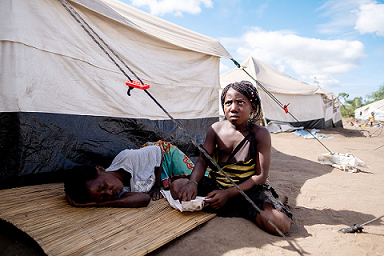
Living under extremely poor and unhygienic conditions, many Idai survivors have fallen ill. |
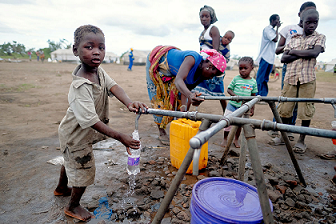
Local survivors relocated to a tent area in Guara Guara face a high risk of consuming contaminated water. |
The disastrous impact left by the cyclone has only added new and difficult challenges in a country already dealing with many issues.

Living under extremely poor and unhygienic conditions, many Idai survivors have fallen ill.

Local survivors relocated to a tent area in Guara Guara face a high risk of consuming contaminated water.
A former colony of Portugal for over four centuries, Mozambique gained independence in 1975. But only two years after, the country was plunged into a civil war that lasted for fifteen years. Its turbulent past hampered economic development, and Mozambique is still one of the poorest and most underdeveloped countries in the world, ridden with inequality and poverty.
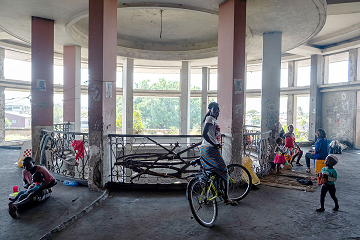
The second floor of the Grande Hotel in Beira, once a luxury hotel turned into a home for thousands of squatters.
Inequality is not only reflected in the differences in income, but also in the uneven distribution of resources between the urban and rural areas. In the worst-hit disaster areas, local survivors in the rural countryside still struggle to keep themselves from starving while residents in Beira city have already resumed their normal lives and leisure activities.
The inequality in the distribution of resources is also prevalent in the country's health care system, with the majority of doctors practicing medicine in the urban areas. In Beira, for example, there are over a hundred doctors in the city of about 530,000 people. In Nhamatanda District located in the countryside about 100 kilometers from Beira, only four doctors serve nearly 300,000 residents in the area.
The country's medical system also has issues of its own. Monica Inroga, a faculty member at the Catholic University of Mozambique, said that there are about three hundred medical students graduating each year in the country, but with only forty spots open for internships, over two hundred medical students cannot find employment. Many medical graduates have not found work for years, and in the end had to give up their medical careers and work in business or other fields.
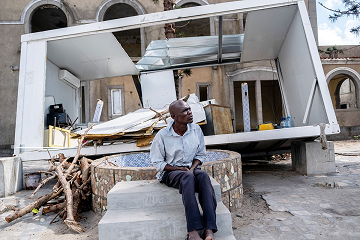
In front of the Grande Hotel in Beira, a local guard sits before large pieces of debris left by Cyclone Idai. He hopes that the hotel can find investors again and reopen.
The disparity of wealth is also striking in the urban areas. Walking on a beach in Beira, I see tourists relaxing and drinking by the shore, and just beside them, there are poor children picking up litter. Similar scenes of stark contrast is seen everywhere in Mozambique, where more than half of the population live below the poverty line.
The country's poverty in urban cities may be illustrated by the conditions at the Grande Hotel in Beira—once a luxury hotel now turned into a run-down building housing more than 3,500 squatters.
When it opened in 1955, the Grande Hotel was dubbed the "Pride of Africa," with majestic halls, large spiral staircases, a cinema, a post office, more than 100 guest rooms, and even an Olympic-size swimming pool. Due to lack of guests and the high cost of maintenance, the hotel closed its doors in 1963 and was turned into a prison for political prisoners during the civil war. After it was deserted, many homeless people started to move into the building, taking up spaces in the rooms and the dark, humid corners of the hotel.
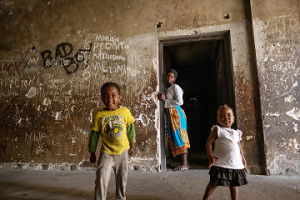
Children grow up in poor living conditions at Beira's Grande Hotel.
Having lived in the Grande Hotel since 1994, Jesmin runs a movie theater nearby—which is actually set up with a small television set playing pirated DVDs of Hollywood films. With 2 meticais (or about 3 US cents), anyone can enter and watch a movie. With two kids, Jesmin's family lives in the Grande Hotel with him. "Some families have lived here for three generations!" As he takes me to the rooftop, Jesmin explains that residents there do not pay any rent, but because it is full, they no longer accept newcomers. With no maintenance, the safety and hygienic conditions of the building is concerning, with the courtyard turned into a garbage dump and the smell of urine permeating everywhere.
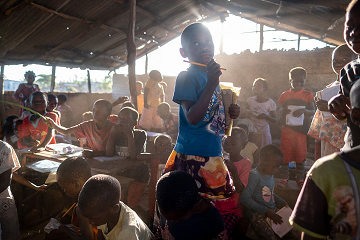
At an elementary school damaged by Idai, the roof of a classroom was rebuilt so students can resume their classes there, but other children can only take classes under a large tree.
Education as Key to Change
Back to the village of Lamego, I visit an elementary school damaged by Cyclone Idai. Rooftops have been blown away, and some classrooms have been completely destroyed. Many students can only take their classes under a large tree outdoors. Other schools in the disaster areas have also been damaged or destroyed by the cyclone. The poor allocation of educational resources in the rural areas has become particularly visible after the disaster.
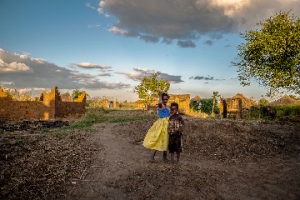
In Lamego, a girl wears a second-hand Snow White dress. Her bright smile contrasts sharply with the cyclone-damaged houses at the back.
Without access to educational resources, children cannot learn new skills and knowledge, missing the opportunity to overcome poverty when they grow up. Flipe, an independent reporter working in Maputo, cannot stress enough the importance of education as the key to breaking the cycle of poverty. Speaking about his childhood, he said: "Everyday, I had to leave my home at 4 a.m., before the sun was up, and walk for 8 kilometers to go to school." On his way to school, he had to cross a small river and faced the risk of being bitten by snakes. Yet, he feels fortunate to be able to continue to receive an education, which helped him change his social and economic status.
Help Along the Way
After Cyclone Idai hit Mozambique, Tzu Chi Foundation has mobilized to help the local survivors, starting with emergency relief work. Tzu Chi volunteers have gathered in Beira and distributed food, aid supplies as well as farming tools and construction materials to help those affected rebuild their lives. More than 10,000 households have benefitted from the aid distributions. Over 24,000 sets of stationery have been handed out to school children, and nearly 2,000 free clinic services have been provided. Tzu Chi is also working towards developing long-term plans to rebuild schools and permanent homes for the local survivors.
As long and difficult as Mozambique's road to recovery from Cyclone Idai may seem, Tzu Chi volunteers will be there for the affected people and continue to do what they can to support the country towards a hopeful future.
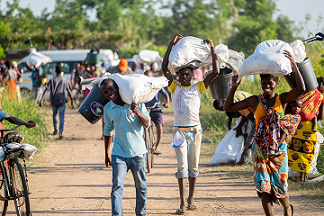
To help local survivors rebuild their lives, Tzu Chi Foundation has distributed food, farming and construction supplies. |
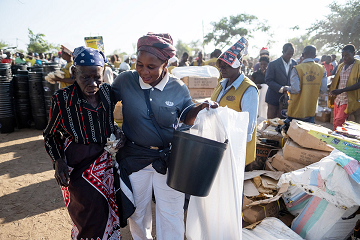
A Tzu Chi volunteer helps and comforts a local survivor at a distribution event. |
A former colony of Portugal for over four centuries, Mozambique gained independence in 1975. But only two years after, the country was plunged into a civil war that lasted for fifteen years. Its turbulent past hampered economic development, and Mozambique is still one of the poorest and most underdeveloped countries in the world, ridden with inequality and poverty.

The second floor of the Grande Hotel in Beira, once a luxury hotel turned into a home for thousands of squatters.
Inequality is not only reflected in the differences in income, but also in the uneven distribution of resources between the urban and rural areas. In the worst-hit disaster areas, local survivors in the rural countryside still struggle to keep themselves from starving while residents in Beira city have already resumed their normal lives and leisure activities.
The inequality in the distribution of resources is also prevalent in the country's health care system, with the majority of doctors practicing medicine in the urban areas. In Beira, for example, there are over a hundred doctors in the city of about 530,000 people. In Nhamatanda District located in the countryside about 100 kilometers from Beira, only four doctors serve nearly 300,000 residents in the area.
The country's medical system also has issues of its own. Monica Inroga, a faculty member at the Catholic University of Mozambique, said that there are about three hundred medical students graduating each year in the country, but with only forty spots open for internships, over two hundred medical students cannot find employment. Many medical graduates have not found work for years, and in the end had to give up their medical careers and work in business or other fields.

In front of the Grande Hotel in Beira, a local guard sits before large pieces of debris left by Cyclone Idai. He hopes that the hotel can find investors again and reopen.
The disparity of wealth is also striking in the urban areas. Walking on a beach in Beira, I see tourists relaxing and drinking by the shore, and just beside them, there are poor children picking up litter. Similar scenes of stark contrast is seen everywhere in Mozambique, where more than half of the population live below the poverty line.
The country's poverty in urban cities may be illustrated by the conditions at the Grande Hotel in Beira—once a luxury hotel now turned into a run-down building housing more than 3,500 squatters.
When it opened in 1955, the Grande Hotel was dubbed the "Pride of Africa," with majestic halls, large spiral staircases, a cinema, a post office, more than 100 guest rooms, and even an Olympic-size swimming pool. Due to lack of guests and the high cost of maintenance, the hotel closed its doors in 1963 and was turned into a prison for political prisoners during the civil war. After it was deserted, many homeless people started to move into the building, taking up spaces in the rooms and the dark, humid corners of the hotel.

Children grow up in poor living conditions at Beira's Grande Hotel.
Having lived in the Grande Hotel since 1994, Jesmin runs a movie theater nearby—which is actually set up with a small television set playing pirated DVDs of Hollywood films. With 2 meticais (or about 3 US cents), anyone can enter and watch a movie. With two kids, Jesmin's family lives in the Grande Hotel with him. "Some families have lived here for three generations!" As he takes me to the rooftop, Jesmin explains that residents there do not pay any rent, but because it is full, they no longer accept newcomers. With no maintenance, the safety and hygienic conditions of the building is concerning, with the courtyard turned into a garbage dump and the smell of urine permeating everywhere.

At an elementary school damaged by Idai, the roof of a classroom was rebuilt so students can resume their classes there, but other children can only take classes under a large tree.
Education as Key to Change
Back to the village of Lamego, I visit an elementary school damaged by Cyclone Idai. Rooftops have been blown away, and some classrooms have been completely destroyed. Many students can only take their classes under a large tree outdoors. Other schools in the disaster areas have also been damaged or destroyed by the cyclone. The poor allocation of educational resources in the rural areas has become particularly visible after the disaster.

In Lamego, a girl wears a second-hand Snow White dress. Her bright smile contrasts sharply with the cyclone-damaged houses at the back.
Without access to educational resources, children cannot learn new skills and knowledge, missing the opportunity to overcome poverty when they grow up. Flipe, an independent reporter working in Maputo, cannot stress enough the importance of education as the key to breaking the cycle of poverty. Speaking about his childhood, he said: "Everyday, I had to leave my home at 4 a.m., before the sun was up, and walk for 8 kilometers to go to school." On his way to school, he had to cross a small river and faced the risk of being bitten by snakes. Yet, he feels fortunate to be able to continue to receive an education, which helped him change his social and economic status.
Help Along the Way
After Cyclone Idai hit Mozambique, Tzu Chi Foundation has mobilized to help the local survivors, starting with emergency relief work. Tzu Chi volunteers have gathered in Beira and distributed food, aid supplies as well as farming tools and construction materials to help those affected rebuild their lives. More than 10,000 households have benefitted from the aid distributions. Over 24,000 sets of stationery have been handed out to school children, and nearly 2,000 free clinic services have been provided. Tzu Chi is also working towards developing long-term plans to rebuild schools and permanent homes for the local survivors.
As long and difficult as Mozambique's road to recovery from Cyclone Idai may seem, Tzu Chi volunteers will be there for the affected people and continue to do what they can to support the country towards a hopeful future.

To help local survivors rebuild their lives, Tzu Chi Foundation has distributed food, farming and construction supplies.

A Tzu Chi volunteer helps and comforts a local survivor at a distribution event.
Contact Us | Plan a Visit | Donate
8 Lide Road, Beitou 11259, Taipei, Taiwan
886-2-2898-9999
005741@daaitv.com
©Tzu Chi Culture and Communication Foundation
All rights reserved.
